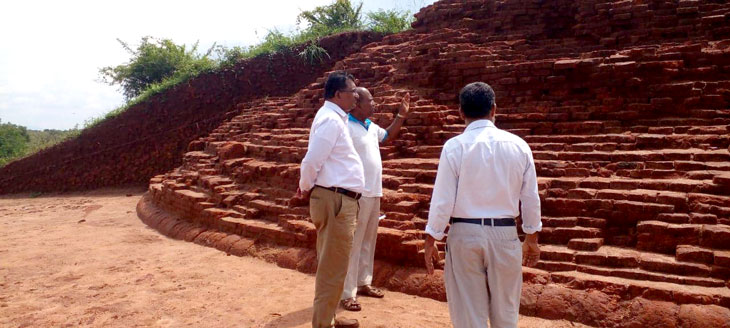-By A Staff Writer

(Lanka-e-News -23.July.2025, 11.30 PM) In an explosive allegation that has rattled both the religious establishment and cultural watchdogs across Sri Lanka, the Chief Incumbent of the Mihintale Raja Maha Viharaya has claimed that the historic 'Anula Stupa'—regarded as the only one in the country dedicated to a female arahant—was secretly “sold” to an overseas party for a staggering Rs. 300 million (approximately USD 1 million) during the tenure of President Ranil Wickremesinghe and Minister of Buddhasasana Vidura Wickramanayake.
The claim, described by some as “absurd” and by others as “deeply alarming”, centres around the Anula Stupa, situated in the ancient sacred site of Mihintale, which is traditionally believed to be the final resting place of Anula Theri—the first female arahant in Sri Lanka, as recorded in the Mahavamsa, the ancient chronicle of Sri Lankan history.
The Viharadhipathi (Chief Monk), Ven. Walawahengunawewe Dhammarathana Thero, has submitted a formal complaint to the Criminal Investigation Department (CID), calling for an investigation into what he describes as a “cultural and financial crime of extraordinary proportions.”
According to the venerable monk’s statement to the media following his complaint, the alleged transaction took place during the period when Ranil Wickremesinghe served as Prime Minister prior to assuming the presidency in 2022.
“This was done in complete secrecy,” the monk claimed. “Ranil Wickremesinghe and Vidura Wickramanayake orchestrated the transfer of ownership—or at the very least custodianship—of the Anula Stupa to a foreign monk based in Taiwan, without informing me, the temple authorities, or even the Mahanayake Thera of the Malwatte Chapter.”
Describing the event as a betrayal of national heritage, Ven. Dhammarathana continued:
“I was the one who brought global recognition to the Anula Stupa. I was the one who began the renovation. Since then, sacred relics and archaeological artefacts have been unearthed. And yet, without any consultation or transparency, a group led by these politicians has sold what is the only known stupa in the world dedicated to a female arahant.”
He further claimed that nine government officials were complicit in the transaction and that the matter must be investigated thoroughly and impartially. “I urge law enforcement and the Department of Archaeology to act. This is not merely about money. This is about the spiritual and cultural dignity of a nation. The stupa is not a commodity.”
The monk also named a Sri Lankan Buddhist monk based in Taiwan as the recipient of the stupa, though this name has not been confirmed through independent verification.
The allegation has sparked a media firestorm and left the Ministry of Buddhasasana scrambling to issue a statement. At the time of writing, neither President Wickremesinghe’s office nor Minister Vidura Wickramanayake has responded to the claims.
The Anula Stupa holds immense significance in Sri Lanka’s Theravada Buddhist tradition. According to Buddhist scripture and archaeological interpretation, Anula Theri was the first woman in Sri Lanka to attain arahantship, the highest level of spiritual enlightenment. The stupa built in her memory has long been revered by Buddhist pilgrims, particularly women.
“This is not just any monument,” said Dr. Hemal Wijeratne, an archaeologist at the University of Peradeniya. “This site symbolises the agency and enlightenment of women in the Buddhist tradition. If there is even the faintest possibility that such a site has been privatised or transferred without public oversight, it demands immediate investigation.”
Monastic leaders from both the Malwatte and Asgiriya chapters are reportedly seeking clarification. “We were unaware of any such development,” said a senior monk in Kandy, requesting anonymity. “Such a move, if true, would constitute sacrilege and deception of the worst kind.”
Leading constitutional experts and public interest lawyers are also weighing in, questioning whether any individual—be they political or religious—has the authority to alienate a public religious monument.
“Religious and archaeological sites are protected under national law and international conventions,” said Attorney-at-Law Niranjan Dissanayake. “The idea that a stupa can be sold, even symbolically, to a foreign entity is legally indefensible unless it’s part of an officially sanctioned cultural exchange, and even then it must be transparent and accountable.”
Some legal experts have urged the Attorney General’s Department to initiate a suo motu inquiry if the government fails to respond formally.
Public sentiment, particularly on social media, has been swift and furious. Accusations of selling national heritage for financial or political gain are resonating with a population increasingly wary of political corruption and elite impunity.
“This is a betrayal of the Buddha’s heritage,” wrote one user on X (formerly Twitter). “What’s next? Selling the Tooth Relic to Singapore?”
While the political establishment remains tight-lipped, opposition parties are reportedly preparing to raise the matter in Parliament. A statement is expected in the coming days.
Whether the alleged transaction was real or symbolic, or whether the accusations are founded in fact or fuelled by internal religious politics, the controversy has reopened deep questions about the protection of Sri Lanka’s ancient heritage in an era of political opportunism.
---------------------------
by (2025-07-23 18:11:23)
Leave a Reply